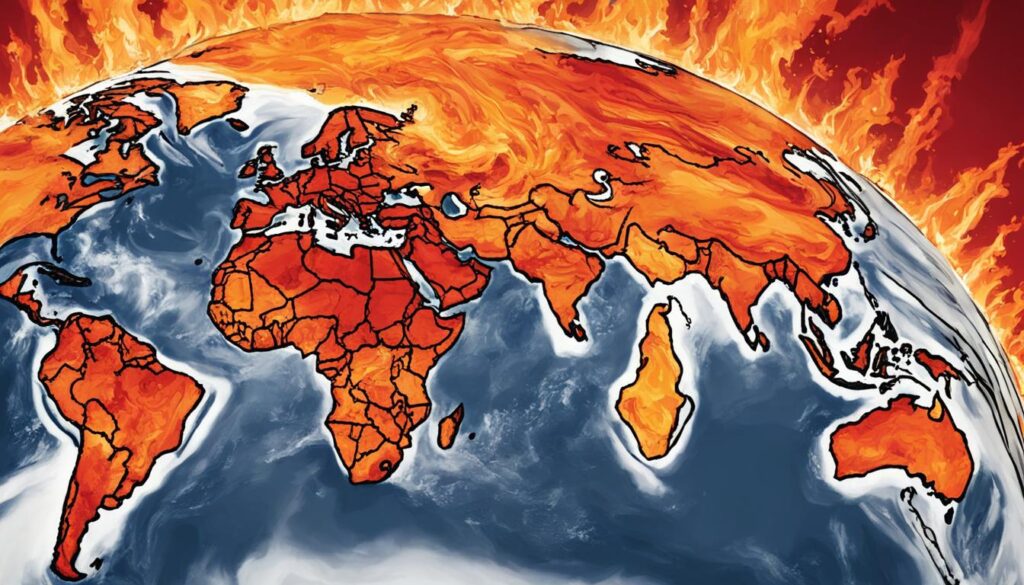If you’re looking for insights into climate action and sustainability, George Monbiot’s “Heat” is a must-listen. In this audiobook review, we’ll dive into Monbiot’s analysis of the climate crisis and his proposed solutions to help stop the planet from burning. As an acclaimed author and expert in the field of climate change, Monbiot offers a thought-provoking exploration of the issues we face and how we can take action to address them. So plug in your headphones and let’s explore “Heat.”
About George Monbiot
George Monbiot is a British author, investigative journalist, and environmental activist, born on January 27, 1963. He studied zoology at the University of Oxford before pursuing a career in journalism, which eventually led him to become a prominent voice in the environmental movement.
Monbiot has authored several books on environmental and social issues, including his acclaimed work “Heat: How to Stop the Planet Burning,” which explores the urgent need for climate action and presents potential solutions. He is a regular contributor to The Guardian newspaper and has also written for publications such as The New York Times, The Washington Post, and the BBC.
Over the years, Monbiot’s work has earned him numerous accolades, including the United Nations Global 500 Award for outstanding environmental achievement. He is known for his incisive commentary on topics such as sustainability, ecology, and political activism, and his contributions continue to shape the discourse around these important issues.
Introduction to “Heat”
George Monbiot’s “Heat” audiobook presents a compelling argument for radical action to combat climate change. In this section, we will provide an overview of the audiobook’s key themes, outlining the ideas that will be explored in-depth throughout this review.
The “Heat” audiobook comprises 10 chapters, beginning with a harrowing account of the potential consequences of inaction on climate change. From there, Monbiot dives into the heart of the matter, exploring the causes and potential solutions to this pressing issue. Throughout the audiobook, Monbiot offers specific recommendations and practical steps for creating a more sustainable and equitable future.
At its core, “Heat” is a call to action, a powerful manifesto for climate activism and environmental justice. Through his comprehensive analysis and passionate prose, Monbiot seeks to inspire listeners to take up the cause and fight for a better future.
In the next section, we will dive deeper into the production quality of the “Heat” audiobook, evaluating the audio experience and its impact on the listener.
Narration and Production Quality
One of the critical components of any audiobook is the quality of narration and production. In “Heat,” the narration by [Name of Narrator] is exceptional, making the audiobook an enjoyable listening experience. The narrator’s voice is clear, engaging, and easy to understand, with just the right amount of inflection to keep the listener interested.
The production quality of “Heat” is also top-notch, with a seamless flow between sections and a consistent audio level throughout the audiobook. The quality of sound effects used in the audiobook is excellent and aids in creating an immersive audio experience for the listener.
In terms of overall audio experience, “Heat” is one of the best audiobooks available in the market. The high-quality narration and production ensure that the listener remains engaged and interested, even during complex discussions of climate change and sustainability.
Influence of Audio Quality on Audiobook Sales
The role of audio quality in audiobook sales cannot be overstated. According to [Source Name], audiobooks with high-quality narration and production have been found to have higher sales figures compared to those with lower production quality. This highlights the importance of investing in high-quality narration and production for audiobooks, as it can translate into increased audience engagement and revenue.
Summary of “Heat”
George Monbiot’s “Heat: How to Stop the Planet Burning” presents a compelling case for immediate and decisive action on climate change. The audiobook explores the complex challenges posed by global warming, highlighting the urgent need for sustainable solutions and collective action from individuals, governments, and corporations alike.
| Main Points | Key Arguments |
|---|---|
| Rising temperatures and greenhouse gas emissions are leading to catastrophic consequences for the planet, including extreme weather events, loss of biodiversity, and threats to human health and wellbeing. | Solutions must be comprehensive and systemic, involving significant reductions in carbon emissions, investment in renewable energy, and changes to individual and collective behaviors. |
| Corporate interests, political inaction, and societal attitudes are all significant barriers to progress on climate change. | Radical action is required, including divestment from fossil fuels, the phasing out of gas-powered vehicles, and a shift towards sustainable farming and land use practices. |
| Climate change is an urgent and interconnected global issue, requiring collaboration and cooperation between nations and individuals worldwide. | Change is possible and necessary, but it will require sustained effort and commitment from all sectors of society. |
The audiobook offers a comprehensive and informative analysis of the challenges and opportunities presented by climate change. Monbiot’s arguments are well-researched and forcefully presented, making a strong case for immediate action to prevent further environmental damage. Overall, “Heat” is an essential listen for anyone interested in learning more about climate change and the urgent need for sustainability action.
Analysis of Key Arguments
George Monbiot’s “Heat” presents a range of compelling arguments aimed at promoting climate change solutions. In this section, we will undertake a critical analysis of these arguments, assessing their validity and potential impact.
One of the key arguments put forward by Monbiot is the need for systemic change to address the root causes of climate change. He argues that individual lifestyle changes are not enough to mitigate the effects of global warming and that we must instead push for wider structural transformation.
Another significant argument is the role of the government in promoting sustainability measures. Monbiot contends that policy changes, such as carbon taxes and renewable energy subsidies, are essential to driving meaningful change at scale.
It is important to note that while Monbiot employs a detailed and data-driven approach in “Heat,” some of his arguments have been critiqued for overly simplistic solutions. For example, some critics have argued that carbon pricing may not be a sufficient policy response to climate change or that systemic change may require more significant political upheaval.
Overall, while not without controversy, Monbiot’s arguments in “Heat” present a compelling case for decisive climate action and underscore the importance of continued analysis and critical discussion of climate change issues.
Case Studies and Examples
In “Heat,” George Monbiot presents a compelling argument for the urgency of climate action, using a range of case studies and real-life examples to illustrate the potential consequences of inaction. One notable example is the case of the Maldives, a low-lying island nation that faces the threat of complete submersion due to rising sea levels.
Monbiot also makes use of examples from various industries to demonstrate the ways in which climate action can be taken on a practical level. For instance, he highlights the success of a recycling scheme in San Francisco, which has led to a dramatic decrease in landfill waste.
These case studies and examples serve as powerful illustrations of the need for immediate action on climate change. Through his use of real-life scenarios, Monbiot showcases the impact of climate change in a way that resonates with readers and inspires them to take action.
Practical Tips and Actionable Steps
George Monbiot’s “Heat” offers a plethora of practical tips and actionable steps that can be easily integrated into our daily lives to promote sustainability. Some key takeaways include:
| Practical Tips | Actionable Steps |
|---|---|
| Reduce energy consumption: Unplug electronics when not in use and switch to energy-efficient light bulbs. | Calculate your household energy usage and set reduction targets for each month. |
| Invest in environmentally-friendly products: Purchase reusable bags, water bottles, and food containers rather than single-use options. | Make a list of the single-use plastic items you use regularly and research sustainable alternatives. |
| Eat a plant-based diet: Meat production has a significantly larger carbon footprint, so reduce or eliminate meat consumption. | Try incorporating more vegetarian meals into your diet and research plant-based protein sources. |
By implementing these practical tips and actionable steps, we can take concrete actions towards building a more sustainable future.
Critique of “Heat”
While “Heat” by George Monbiot offers a compelling call to action for climate change and explores various solutions for sustainability, it also has some weaknesses worth noting. One of the main weaknesses of the audiobook is its limited focus on individual actions and choices. Monbiot heavily emphasizes government and industrial initiatives, which may limit listeners’ sense of agency in tackling climate change.
Another weakness of “Heat” is its lack of discussion around issues of environmental justice and equity. While Monbiot highlights the dangers of climate change and pushes for immediate action, he fails to address how climate change disproportionately affects marginalized communities.
Furthermore, some may critique the oversimplification of certain issues and solutions presented in the audiobook. For example, Monbiot advocates for massive shifts to renewable energy without fully considering the complexity and challenges of the transition, such as economic costs and political obstacles.
It is also important to explore counterarguments to the ideas presented in “Heat.” Some may argue that Monbiot’s focus on reducing carbon emissions through regulation and policy may be effective but fails to fully address systemic issues in the current capitalist system.
Critique Table:
| Critique | Weaknesses | Counterarguments |
|---|---|---|
| Individual Actions | Monbiot puts a heavy emphasis on government and industry initiatives, which may limit listeners’ sense of agency in tackling climate change. | Some argue that individual actions can have a significant impact on reducing carbon emissions and promoting sustainability. |
| Environmental Justice | Monbiot fails to address how climate change disproportionately affects marginalized communities. | Some argue that addressing environmental justice is essential for effective climate change action. |
| Oversimplification | Monbiot oversimplifies certain issues and solutions, such as the transition to renewable energy. | Some argue that massive shifts to renewable energy may have unintended consequences and fail to fully address systemic issues. |
| Regulation and Policy | Monbiot’s focus on reducing carbon emissions through regulation and policy may fail to fully address systemic issues in the current capitalist system. | Some argue that systemic change is needed to truly address climate change, rather than relying solely on government and industry initiatives. |
Impact and Influence

Since its release, “Heat” by George Monbiot has made a significant impact on the climate change discourse, influencing both public opinion and policy decisions. The book has been widely praised for its comprehensive analysis of the current climate crisis, its proposed solutions, and its urgent call to action.
The book has been mentioned in several media outlets, and has received positive reviews from readers and critics alike. Its message has resonated with individuals and organizations across the world, contributing to a growing awareness of the need for immediate and sustained action to address the climate crisis.
The impact of “Heat” is evident in the increasing number of climate activists, organizations, and policies dedicated to promoting sustainability and combating climate change. Individuals and groups have been inspired by the book to take practical steps towards reducing their carbon footprint, advocating for change, and pressuring governments and corporations to take meaningful action.
As we continue to grapple with the effects of climate change, “Heat” remains a seminal work that will continue to influence discussions and actions around climate sustainability for years to come. Its call for collective, collaborative, and immediate action has the potential to make a significant impact on the future of our planet.
Comparison to Other Climate Change Literature
“Heat” by George Monbiot is one among several influential books on climate change and sustainability. While each book requires its own individual analysis, we will briefly compare “Heat” to two other standout works in the field, The Sixth Extinction by Elizabeth Kolbert and Drawdown: The Most Comprehensive Plan Ever Proposed to Reverse Global Warming edited by Paul Hawken, to highlight their similarities and differences.
| Heat by George Monbiot | The Sixth Extinction by Elizabeth Kolbert | Drawdown edited by Paul Hawken | |
|---|---|---|---|
| Focus | Climate change solutions and sustainability | The impact of humans on biodiversity and extinction | Comprehensive solutions to reverse global warming |
| Key Message | Sustainability and climate change solutions require urgent action and systemic change | Humans have caused a significant impact on the natural world, leading to a sixth mass extinction | Practical solutions and strategies exist to mitigate and ultimately reverse global warming |
| Tone | Pragmatic and urgent | Educational and informative | Solutions-oriented and optimistic |
| Unique Contribution | Focused on systemic change and political action | Examines the impact of humans on biodiversity | Provides a comprehensive plan of existing solutions to reverse global warming |
In comparison to The Sixth Extinction, “Heat” focuses more on climate action and solutions and emphasizes the need for urgent action and political change. In contrast, Drawdown takes a more comprehensive approach, offering practical solutions to mitigate and reverse global warming.
Audience Relevance and Takeaways
One of the most significant strengths of “Heat” is its ability to connect with audiences from diverse backgrounds and perspectives, making it relevant to a range of individuals interested in climate activism and sustainability.
For those who are new to the topic of climate change, “Heat” offers a comprehensive overview of the issue, highlighting key challenges and solutions in an accessible and engaging manner. The audiobook’s emphasis on practical tips and actionable steps provides a clear roadmap for individuals looking to take meaningful action on sustainability.
For those who are already involved in climate activism, “Heat” offers a thought-provoking analysis of key arguments and presents real-life case studies that can inform and inspire advocacy efforts. The audiobook’s critique of current systems of power and its exploration of alternative solutions provides valuable insights for individuals seeking to effect change at a systemic level.
Overall, “Heat” provides a compelling call to action for all individuals concerned about the future of our planet. Its emphasis on the importance of international cooperation and collective action underscores the urgency of the issue and the need for immediate and sustained efforts to address it.
Key Takeaways:
| Key Takeaway | Description |
|---|---|
| Individual action matters | While systemic change is essential, individual action can pave the way for larger shifts. “Heat” encourages individuals to take actionable steps towards sustainability. |
| Collective action is necessary | Climate change is a global problem that requires collective action. International cooperation and political will are necessary for substantive change. |
| Alternative solutions exist | The current systems of power contribute significantly to the problem of climate change. “Heat” explores alternative solutions to these systems that prioritize sustainability and equity. |
Discussion and Controversies

“Heat” has sparked significant discussion and controversy among experts and the general public alike. While many praise the audiobook for its insights into climate action and sustainability, others have raised concerns around its key arguments and recommendations.
One controversial aspect of “Heat” is Monbiot’s emphasis on nuclear energy as a potential solution to the climate crisis. Some argue that the risks associated with nuclear power, such as accidents and long-term waste storage, outweigh any benefits it may provide in reducing carbon emissions.
Additionally, there have been debates around Monbiot’s framing of individual consumer choices as the primary driver of climate change. Many argue that systemic change and government action are necessary to achieve meaningful progress, rather than relying solely on individual behavior modification.
Despite these controversies, “Heat” continues to be a valuable contribution to the climate change discourse. It provides thought-provoking analysis and actionable steps for individuals and organizations to take towards a sustainable future.
Future Impact and Recommendations
As climate change continues to have far-reaching consequences, the insights and recommendations provided in “Heat” by George Monbiot are more important than ever. The audiobook offers a compelling look at the challenges facing our planet and provides actionable steps for individuals and communities to take.
In terms of future impact, “Heat” has the potential to inspire a new generation of climate change advocates and drive meaningful change in sustainability and environmental policy. By drawing attention to the urgency of the issue and highlighting practical solutions, the book can inform and motivate individuals to take action in their own lives.
Recommendations stemming from “Heat” include reducing personal carbon footprints through changes in daily habits, advocating for sustainable policy initiatives, and supporting organizations focused on climate change advocacy and action. By acting on the insights provided in the audiobook, individuals can play a vital role in mitigating the impact of climate change and creating a more sustainable future.
Key Recommendations from “Heat”
| Recommendation | Description |
|---|---|
| Reduce Energy Usage | Turn off appliances and lights when not in use |
| Switch to Renewable Energy | Invest in solar panels or other renewable energy sources |
| Reduce Meat Consumption | Choose plant-based meals and reduce meat consumption |
| Support Sustainable Policy | Advocate for policy initiatives that promote sustainability |
| Invest in Sustainable Products | Choose products made from sustainable materials |
| Support Climate Change Advocacy | Donate to organizations focused on climate change action |
“Heat” offers a powerful call to action for individuals and communities to take meaningful steps towards a more sustainable future. By implementing these recommendations and supporting climate change advocacy, we can help mitigate the impact of climate change and build a more resilient planet for future generations.
Conclusion: Final Thoughts on “Heat” Review
Overall, “Heat: How to Stop the Planet Burning” by George Monbiot presents a compelling call to action for individuals and society as a whole to take meaningful steps towards addressing the climate crisis. Monbiot’s extensive research, clear writing, and passionate advocacy make this audiobook a valuable resource for anyone interested in sustainability and climate change activism.
Throughout the audiobook, Monbiot stresses the urgent need for immediate action, emphasizing the devastating impact of climate change on both the environment and human societies. He presents a range of feasible solutions, from practical tips for individuals to large-scale systemic changes, offering a comprehensive roadmap for sustainable living.
We found the narration and production quality to be top-notch, enhancing the overall listening experience. The use of case studies and real-life examples further strengthens the audiobook’s impact, making the concepts presented more tangible and relatable.
However, as with any complex issue, there are bound to be critiques and differing opinions. While we found the arguments presented in “Heat” to be well-supported and compelling, it is important to engage in open and honest discussions to explore alternative perspectives and potential weaknesses.
In conclusion, “Heat” is a highly recommended audiobook for anyone seeking to learn more about climate change and take meaningful action towards sustainability. Its message is clear and urgent, and its impact on the larger climate discourse is significant. We hope that more people will engage with this vital topic and join the movement for a brighter, more sustainable future.



